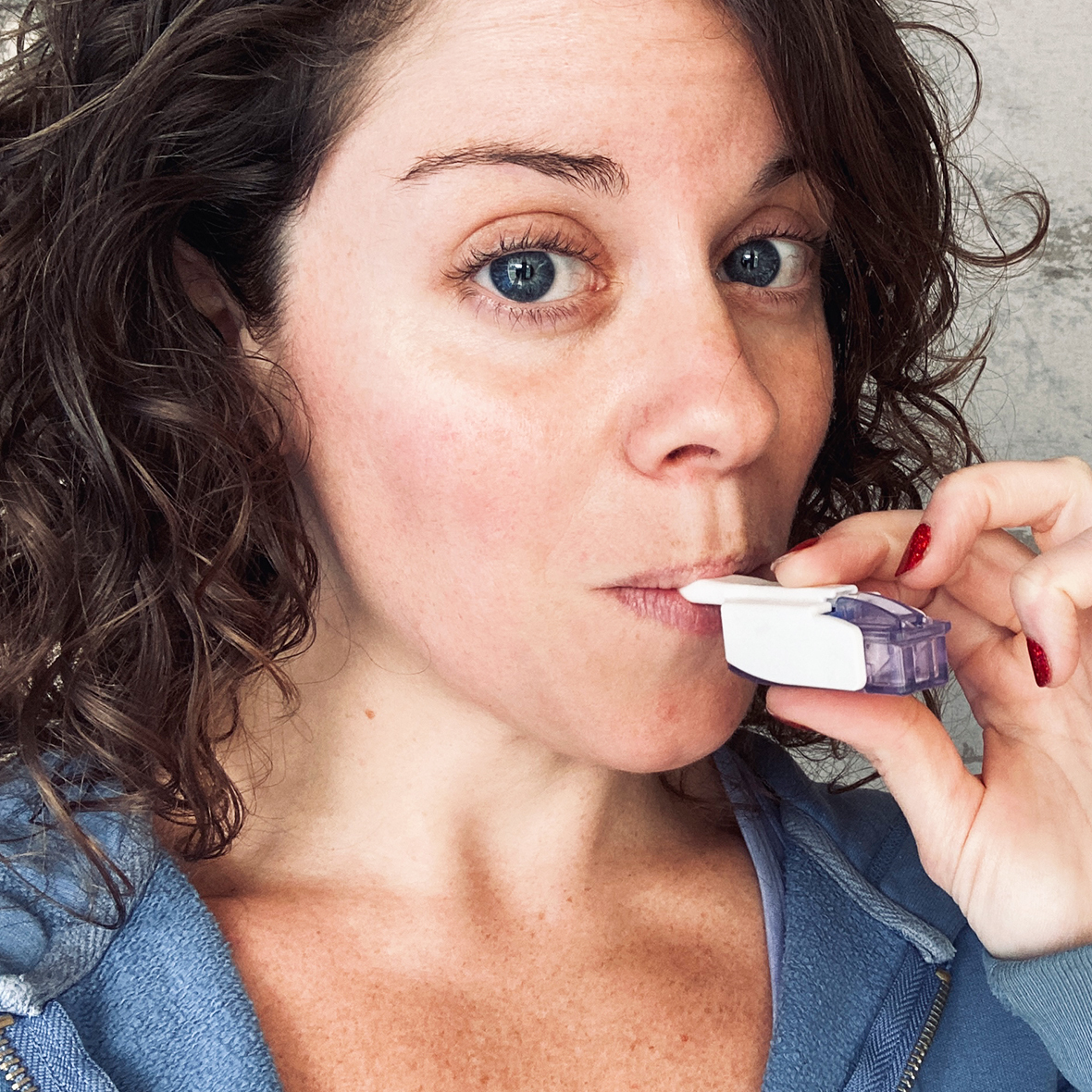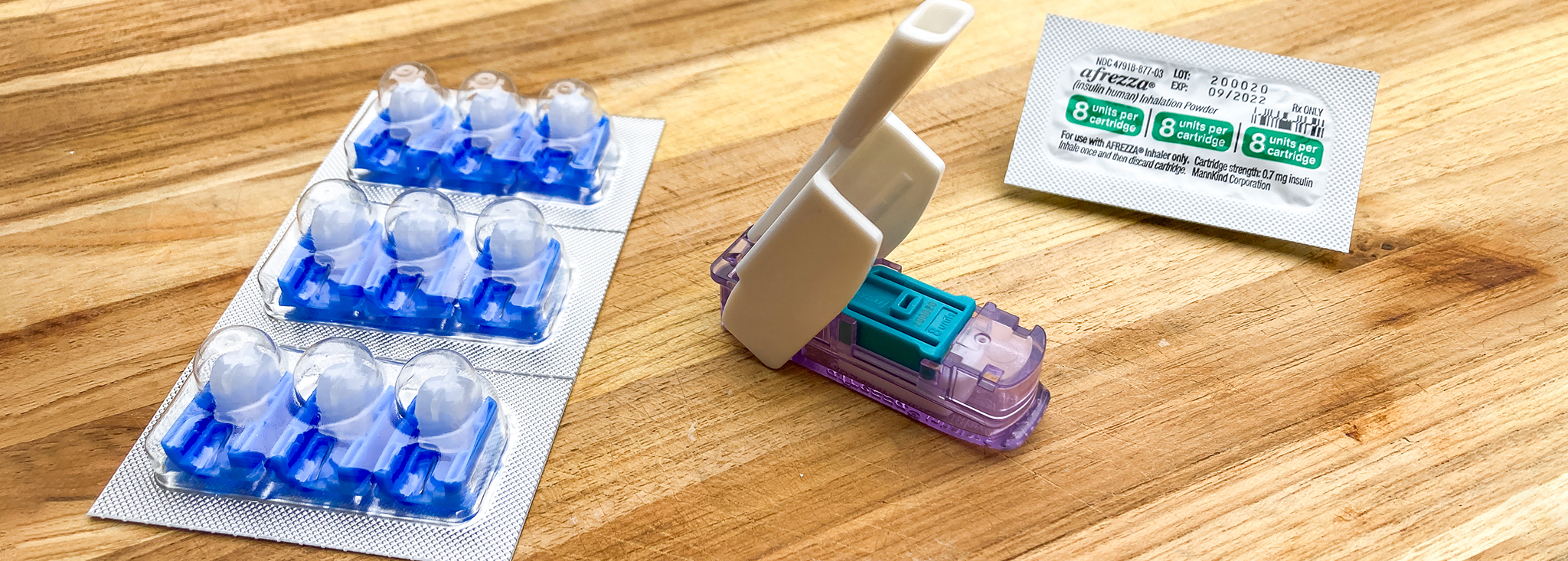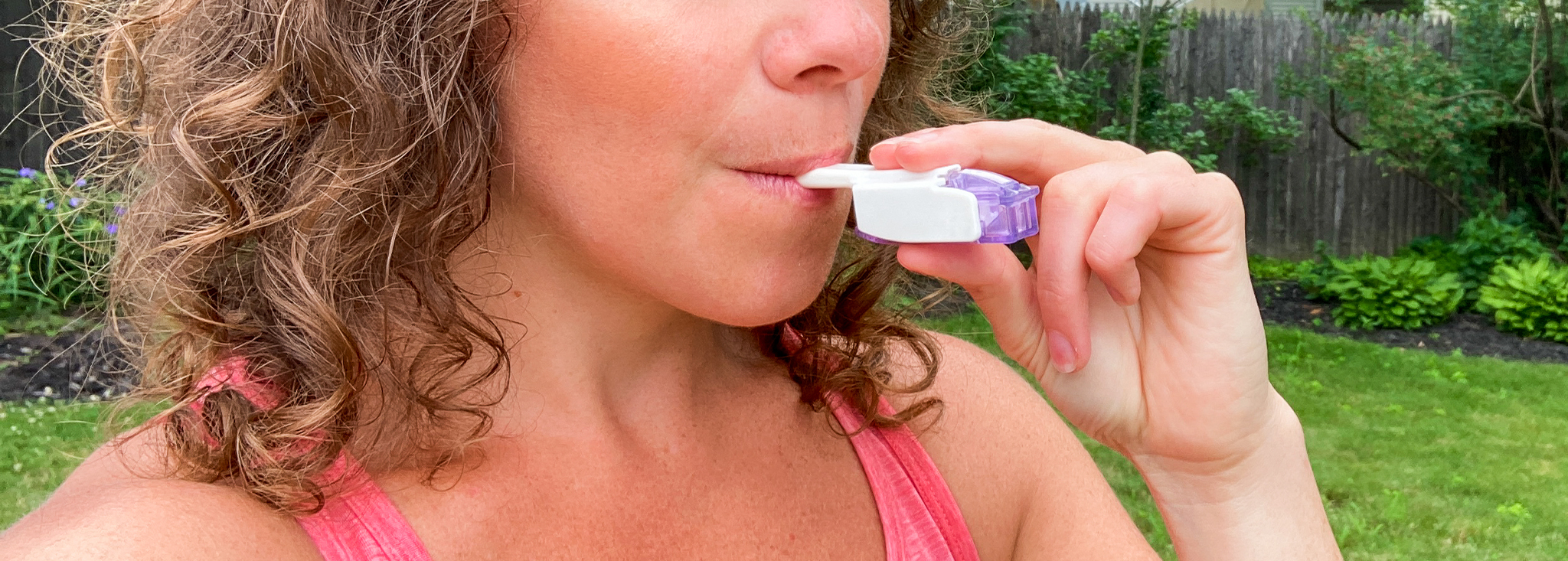Inhaled Insulin: Myths Vs. Facts
Written by: Ginger Vieira
9 minute read
December 15, 2021
This resource on inhaled insulin was made possible with support from MannKind (makers of Afrezza® (insulin human) Inhalation Powder). Beyond Type 1 maintains editorial control of all content published on our platforms.
Inhaled insulin—Afrezza (insulin human) Inhalation Powder from MannKind—has existed now for several years, but there are many myths floating around the diabetes community about this zero-poke method of taking your insulin.
What is AFREZZA?
- Afrezza is a man-made insulin that is breathed-in through your lungs (inhaled) and is used to control high blood sugar in adults with diabetes mellitus.
- Afrezza is not for use in place of long-acting insulin. Afrezza must be used with long-acting insulin in people who have type 1 diabetes mellitus.
- Afrezza is not for use to treat diabetic ketoacidosis.
- It is not known if Afrezza is safe and effective for use in people who smoke. Afrezza is not for use in people who smoke or have recently stopped smoking (less than six months).
- It is not known if Afrezza is safe and effective in children under 18 years of age.
Here, we’ll look at the most common myths and misconceptions that we hear about—and the facts—about Afrezza.
Myth #1: It’s only for people with Type 2 diabetes.
Fact: Afrezza is approved for use in adult patients with type 1 or type 2 diabetes.
People with type 1 and type 2 diabetes appreciate Afrezza for its ultra-fast action time, how quickly it’s out of your system and how easy it is to use with a quick inhalation.
 Afrezza can be used in both type 1 and Type 2 diabetes as your mealtime or short-acting insulin. (In patients with type 1 diabetes, you must use Afrezza with a long-acting insulin.)
Afrezza can be used in both type 1 and Type 2 diabetes as your mealtime or short-acting insulin. (In patients with type 1 diabetes, you must use Afrezza with a long-acting insulin.)
Some primary care doctors and endocrinologists believe that Afrezza is intended only for people with type 2, so there can be some resistance when it comes to prescribing it.
There’s also a learning curve to transitioning your blood sugar management to Afrezza from injected rapid-acting insulin.
The differences in Afrezza’s dosages, how quickly it affects your blood sugar, and the length of time it’s in your bloodstream are different enough from injected rapid-acting insulin that you’ll need to increase your glucose monitoring and be ready to make adjustments with your doctor the first few weeks of using it. If your doctor isn’t familiar with Afrezza, they may try to steer you clear of it altogether.
Myth #2: The 4/8/12-unit dosing cartridges won’t work for carb-counting or Type 1 diabetes.
Fact: It’s not the same as dosing injected insulin.
Learning how to dose Afrezza can take a few weeks working with your doctor to find the right dose. Afrezza explains the conversion of dosing injected rapid-acting insulin to inhaled insulin like this:
| Afrezza insulin cartridge | Injected rapid-acting insulin |
| 4-unit cartridge (blue) | Up to 4 units |
| 8-unit cartridge (green) | 5 to 8 units |
| 12-unit cartridge (yellow) | 9 to 12 units |
While you may have used 2 units of rapid-acting insulin, for example, for your high-protein/moderate-carb lunch, you may find that the 4-unit Afrezza dose is equivalent in coverage.
Based on clinical trials, it may take 1.5x the amount of Afrezza to achieve the same blood sugar control as injected insulin.
Another factor to consider is that some people may need to increase their long-acting background insulin dose when switching to Afrezza. In a clinical trial, people reported a 15 percent increase in their background insulin dose on average over the course of the trial.
This is because it’s out of your system so quickly. While other rapid-acting injectable insulins have a four to five-hour duration of action that overlaps with your background dose between meals, Afrezza is out of your system often within one and a half to three hours, depending on the dose.
Myth #3: Afrezza works too fast, increasing the risk of severe lows.
Fact: In a clinical trial, hypoglycemia with Afrezza was similar to aspart in the first two hours after a meal, and lower two to five hours after a meal.
Hypoglycemia is the most common adverse reaction of insulin therapy, including Afrezza, and may be serious and life-threatening.
For years, you’ve been told to take your injected mealtime insulin before you eat—and at the very least, when you start eating. That’s because injected mealtime insulin takes at least 30 minutes to truly start affecting your blood sugar.
Afrezza is fast—really fast. It starts affecting your blood sugar in as little as 12 minutes. If you take Afrezza before you start eating, the fast action time of this insulin may hit your bloodstream before your meal is even being digested.
With Afrezza, you no longer need to pre-bolus your insulin for meals because Afrezza is out of the body so fast it allows for supplemental doses one to two hours after meals.
Using any type of insulin increases your risk of low blood sugars. That is why it is important for all people with diabetes on insulin to be able to recognize the signs and symptoms of low blood sugar. The risk of low blood sugar depends on many factors, one of which is the type of insulin and how long it works in your body.
Myth #4: Afrezza causes lung cancer.
Fact: Let’s take a closer look at research on Afrezza and lung cancer and lung function…
In short, so far there is no research that suggests Afrezza causes lung cancer. In clinical trials, Afrezza was studied in over 3,000 patients with type 1 or type 2 diabetes. In studies of Afrezza in people with diabetes, lung cancer occurred in a few more people who were taking Afrezza than in people who were taking other diabetes medications.
There were too few cases to know if lung cancer was related to Afrezza. If you have lung cancer, you and your healthcare provider should decide if you should use Afrezza.
In terms of lung function, Afrezza has been found to cause a slight decrease in your overall lung function.
Doctors will perform lung testing before prescribing Afrezza, and a check-up on your lungs after you’ve been using it for six months and a year after. Afrezza is not recommended in patients with chronic lung disease such as asthma or chronic obstructive pulmonary disease (COPD). It is also important to take Afrezza at room temperature.
Before an Afrezza cartridge is put in an inhaler, it must be at room temperature for 10 minutes. Having a sip of water before and after inhalation may also help. In the clinical studies, coughs were mild and typically declined with continued use after one to four weeks. If you develop a persistent or recurring cough, or have breathing difficulties while using Afrezza, contact your healthcare provider.
Important Safety Information
What is the most important information I should know about AFREZZA?
AFREZZA can cause serious side effects, including:
- Sudden lung problems (bronchospasms). Do not use AFREZZA if you have long-term (chronic) lung problems such as asthma or chronic obstructive pulmonary disease (COPD). Before starting AFREZZA, your healthcare provider will give you a breathing test to check how your lungs are working.
What is AFREZZA?
- AFREZZA is a man-made insulin that is breathed- in through your lungs (inhaled) and is used to control high blood sugar in adults with diabetes mellitus.
- AFREZZA is not for use in place of long-acting insulin. AFREZZA must be used with long-acting insulin in people who have type 1 diabetes mellitus.
- AFREZZA is not for use to treat diabetic ketoacidosis.
- It is not known if AFREZZA is safe and effective for use in people who smoke. AFREZZA is not for use in people who smoke or have recently stopped smoking (less than six months).
- It is not known if AFREZZA is safe and effective in children under 18 years of age.
What should I tell my healthcare provider before using AFREZZA?
Before using AFREZZA, tell your healthcare provider about all your medical conditions, including if you:
- Have lung problems such as asthma or COPD
- Have or have had lung cancer
- Are using any inhaled medications
- Smoke or have recently stopped smoking
- Have kidney or liver problems
- Are pregnant, planning to become pregnant, or are breastfeeding. AFREZZA may harm your unborn or breastfeeding baby.
Tell your healthcare provider about all the medicines you take, including prescription and over-the-counter medicines, vitamins, or herbal supplements.
Before you start using AFREZZA, talk to your healthcare provider about low blood sugar and how to manage it.
What should I avoid while using AFREZZA?
While using AFREZZA do not:
- Drive or operate heavy machinery, until you know how AFREZZA affects you
- Drink alcohol or use over-the-counter medicines that contain alcohol
- Smoke
Do not use AFREZZA if you:
- Have chronic lung problems such as asthma or COPD
- Are allergic to regular human insulin or any of the ingredients in AFREZZA.
What are the possible side effects of AFREZZA?
AFREZZA may cause serious side effects that can lead to death, including:
See “What is the most important information I should know about AFREZZA?”
Low blood sugar (hypoglycemia). Signs and symptoms that may indicate low blood sugar include:
- Dizziness or light-headedness, sweating, confusion, headache, blurred vision, slurred speech, shakiness, fast heartbeat, anxiety, irritability or mood change, hunger.
Decreased lung function. Your healthcare provider should check how your lungs are working before you start using AFREZZA, six months after you start using it, and yearly after that.
Lung cancer. In studies of AFREZZA in people with diabetes, lung cancer occurred in a few more people who were taking AFREZZA than in people who were taking other diabetes medications. There were too few cases to know if lung cancer was related to AFREZZA. If you have lung cancer, you and your healthcare provider should decide if you should use AFREZZA.
Diabetic ketoacidosis. Talk to your healthcare provider if you have an illness. Your AFREZZA dose or how often you check your blood sugar may need to be changed.
Severe allergic reaction (whole body reaction). Get medical help right away if you have any of these signs or symptoms of a severe allergic reaction:
- A rash over your whole body, trouble breathing, a fast heartbeat, or sweating.
Low potassium in your blood (hypokalemia).
Heart failure. Taking certain diabetes pills called thiazolidinediones or “TZDs” with AFREZZA may cause heart failure in some people. This can happen even if you have never had heart failure or heart problems before. If you already have heart failure it may get worse while you take TZDs with AFREZZA. Your healthcare provider should monitor you closely while you are taking TZDs with AFREZZA. Tell your healthcare provider if you have any new or worse symptoms of heart failure including:
- Shortness of breath, swelling of your ankles or feet, sudden weight gain.
Get emergency medical help if you have:
- Trouble breathing, shortness of breath, fast heartbeat, swelling of your face, tongue, or throat, sweating, extreme drowsiness, dizziness, confusion.
The most common side effects of AFREZZA include:
- Low blood sugar (hypoglycemia), cough, sore throat
These are not all the possible side effects of AFREZZA. Call your doctor for medical advice about side effects.
Please see full Prescribing Information and Medication Guide, including BOXED WARNING on Afrezza.com.
Related Resources

Editor’s note: This article includes Ginger’s personal experience taking metformin in addition to her daily...
Read more

Editor’s Note: Educational content related to inhaled insulin is made possible with support from MannKind,...
Read more

Editor’s Note: Educational content related to inhaled insulin is made possible with support from MannKind,...
Read more


